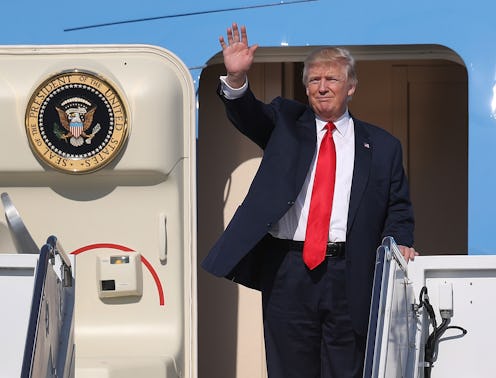News
Why I Insist On Calling Trump "President"

In the past year, Donald Trump has acquired many titles that a lot of people believe he didn't deserve. From presumptive Republican nominee to president, there has been an underlying ambiguity about how those of us opposed to Trump as a man, a public figure, and a president should refer to him. Despite the many monikers used to refer to the new commander-in-chief, I insist on calling him "President Trump," if for no other reason than to remind me and everyone I know of the exact nature of what we're fighting against.
On Feb. 8, Bernice King, the daughter of Martin Luther King, Jr. and Coretta Scott King, shared a post on Facebook on suggestions for resisting Trump's administration. The first tip on King's list was to never mention Trump by name. Many who were already using euphemisms for the president became all the more emboldened in doing so. While it's a personal choice to refer to Trump as "45," the more tongue-in-cheek "Agent Orange," or my personal favorite, "Cheeto Mussolini," I fundamentally disagree with calling the man anything but what he is — our 45th president. I do so not to legitimize him, his ideas, or his administration, but instead to communicate effectively the very real predicament we haven't just found ourselves in, but may have been instrumental in creating.
King's wisdom is solid, and her reasoning is part and parcel of why I feel so compelled to always call Trump our president. She calls the sparing use of his name "a strategic tactic," and my philosophy is, too — a tactic used to get liberals and progressives whose bafflement at Trump's win has stunned them into silence and inaction, unable to accept the seemingly unthinkable reality of his presidency.
Rather than accepting that we are in for the fight of our lives, some people rallied around the impossible notion that we could change the core values of the electoral college in enough time to overturn his win. People even donated to Green Party candidate Jill Stein's recount bid — money that could have gone to organizations dedicated to protecting the livelihoods of Muslims, people of color, trans folks, and the countless others who are now in more danger than ever before.
From the first anti-Trump protests birthed by the election to Presidents' Day protests, "Not My President" signs and hashtags have flourished for months now. The intended message of those signs was to communicate the holders' displeasure and anger at Trump's shocking win, and to show how much they oppose a man they don't believe deserves to be president.
But to me, there was a startling underlying message on those signs, one that I've seen time and again since the election — that the holder denies culpability in Trump's rise to the presidency, and in claiming that he isn't their president and that they didn't vote for him, they are not responsible for the permissive "slacktivist" climate that contributed to his win.
Political semantics are incredibly powerful. By re-branding the Affordable Care Act as "ObamaCare," Republicans effectively tied widened access to healthcare for previously uninsured people to a president that was unpopular with their constituency. By dressing up white supremacists in stylish ties and skinny suits and calling them "alt-right," people who are essentially neo-Nazis have found their way into the president's inner circle. Trump's election rhetoric is a study in coded language. And I fear that by calling Trump anything other than the president, even in attempts to delegitimize the man and his administration, liberals are playing into the strategic rebranding tactics that worked so well for Trump and his supporters.
By no means do I wish to pass judgment on the individual coping strategies people use to deal with the Trump's presidency, especially before he was inaugurated. I spent the first month after the election hiding in my house, unable to deal with the PTSD triggers associated with the fear of Islamophobic hate crimes. But what I've witnessed among some liberals appears to be coping mechanisms that occur simultaneously with a professed will to fight President Trump at every turn. We all have to cope with the reality of the Trump administration, but we must not let those mechanisms come at the price of fantasy or delusion. Trump is the president, and it's awfully hard to fight a legally elected president when you refuse to speak truth to what's really going on.
You cannot fight a president with a funny moniker when that president occupies the Oval Office. And I fear that by using a series of creative, humorous, or otherwise euphemistic names to refer to the president, people are still pulling the wool over their eyes willfully turn away from the horrific reality of the Trump presidency.